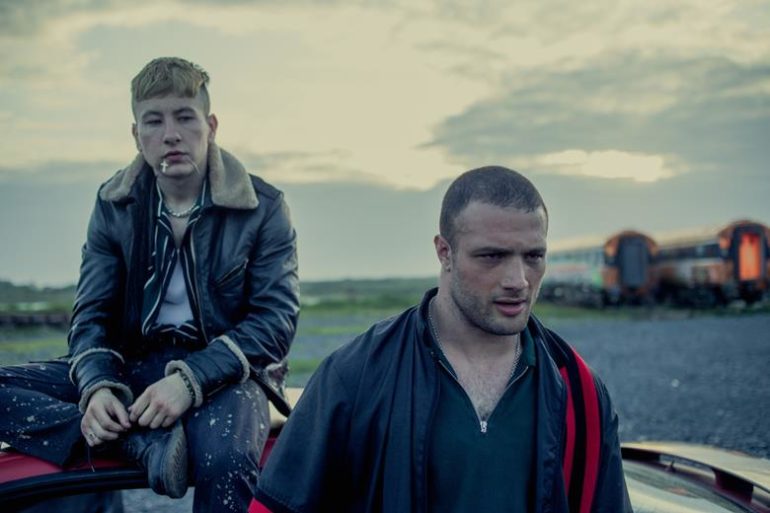“The violence was an undirected venting of pressure,” Colin Barrett’s narrator tells us, “and meant nothing beyond the compulsion of its expression.” This line appears early in the short story “Calm With Horses” and it refers to the main character Douglas Armstrong’s autistic son Jack. Similar lines, spoken by Armstrong, open the film Calm With Horses. It begins with a meditation upon violence, its sources, its uses. Armstrong barely understands its driving motivations, but he can intuit some of its purposes. It’s clear that violence is a means of communication for Armstrong, perhaps the only one that he knows but where does it come from?
Armstrong’s rage primarily comes from frustration and confusion; his violence is the assertion of a presence, an identity. Oftentimes it is the demonstration of loyalty. Douglas was once a talented boxer but by the time that we meet him, he is a drug pusher and criminal enforcer to the Devers criminal family. To his best friend turned boss Dympna Devers he is known as “Arm” but to Ursula, the mother of his child, he is simply Douglas. The two names distinguish his competing identities and divided loyalties. Both Dympna and Ursula spew poison in Armstrong’s ear about the other – his relationship to both of them is much more complex than either cares to admit or perhaps realizes.
Calm With Horses is, on a basic level, about the decision Armstrong has to make between these two families. Ursula wants to move to Galway with Jack so that he can receive better help while the Devers family are, for the first time, asking Arm to murder a man who has crossed them.

What makes Calm With Horses stand out from the already packed subgenre of Irish crime is the depth of its perception into both its characters psychologies and their inhibiting environments. Shot and set in the West of Ireland (something which helps distinguish it within its respective genre), the serenity of Calm With Horses’ frequently picturesque backdrops contrasts against the turbulence within the characters’ lives. The West, rather than being a place of peace and beauty, is stifling and sparse, depopulated and sterile: its bareness often seems to creep in and infect the lives of its characters.
Rowland’s eye never strays from his characters and his film ceaselessly seeks to empathise with them, doing so expressively and stylistically. One particularly brilliant example of this comes in a club scene, the pulsating, thumping music builds to a crescendo just as Armstrong’s cocaine-induced racing heart does, as he looks around, spotting Ursula out drinking with their child’s horse-riding trainer. The rising music and Armstrong’s crinkled face tells us all: his initial reaction, his urge, his impulse, is to resort to jealousy-adduced violence – the good in Armstrong however restrains him.
Calm With Horses is a blistering and impressive debut from Nick Rowland. All the films techniques synchronize to elicit empathy. There is a remarkable assurance to Rowland’s voice. Calm With Horses possesses a striking visual flair, it knows the importance of keeping an equilibrium between tranquillity and tension, and each of its key performers is an absolute knockout. Cosmo Jarvis is utterly brilliant as a soulful, brooding, primordial Douglas Armstrong who is both violent thug and a lost child at heart. Jarvis is buffeted by brilliant side performances on either side of him from Niamh Algar and Barry Keoghan. Algar, as Ursula, never succumbs to the potential monotony of her role by being either too spiteful of Douglas or too submissive – in her scenes, she simultaneously sparkles with love for Douglas and frustrated disappointment at what he has become. Keoghan, as always, brings a ferocious vivacity to his performance which wonderfully offsets the silent contemplativeness of Jarvis. He is the chaos to Arm’s typical calm, exuding and exemplifying the charming, wicked allures of a life of crime without ever wholly concealing his own vulnerabilities.
There is little doubt that all involved in Calm With Horses will go on to do great things – and surely they’ll all look back on this film as one of those great things. Some of you may be cooped up indoors over the weekend but for those of you who did wander out, you could do a lot worse than spending it in the cinema watching Calm With Horses.

